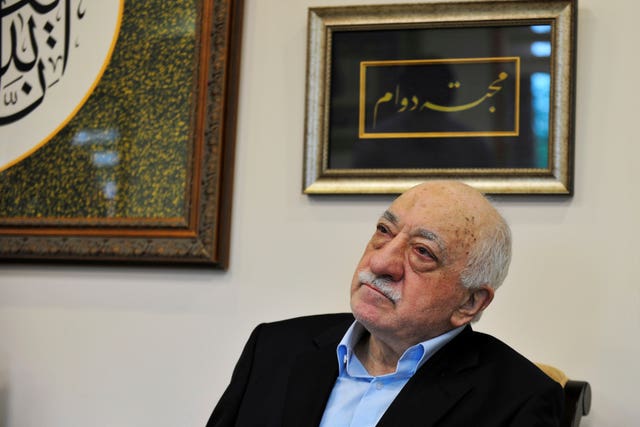Self-exiled Turkish spiritual leader Fethullah Gulen dies in US
The Islamic cleric was accused of masterminding the failed 2016 Turkish coup attempt.

Fethullah Gulen, a reclusive US-based Islamic cleric who inspired a global social movement while facing accusations he masterminded a failed 2016 coup in his native Turkey, has died, officials said.
Abdullah Bozkurt, the former editor of the Gulen-linked Today’s Zaman newspaper, who is now in exile in Sweden, said Mr Gulen’s nephew, Kemal Gulen, confirmed the death.
Fethullah Gulen was in his eighties and had long been in ill health.
The state-run Anadolu Agency quoted the Turkish Foreign Ministry’s Hakan Fidan as saying the death has been confirmed by Turkish intelligence sources.
Mr Gulen spent the last decades of his life in self-exile, living on a gated compound in Pennsylvania’s Pocono Mountains from where he continued to wield influence among his millions of followers in Turkey and throughout the world.
He espoused a philosophy that blended Sufism – a mystical form of Islam – with staunch advocacy of democracy, education, science and inter-faith dialogue.
Mr Gulen began as an ally of Turkish leader Recep Tayyip Erdogan, but became a foe.

He called Mr Erdogan an authoritarian bent on accumulating power and crushing dissent. Mr Erdogan cast Mr Gulen as a terrorist, accusing him of orchestrating the attempted military coup on the night of July 15 2016, when factions within the military used tanks, warplanes and helicopters to try to overthrow the government.
Heeding a call from the President, thousands took to the streets to oppose the takeover attempt.
The coup-plotters fired at crowds and bombed parliament and other government buildings. A total of 251 people were killed and around 2,200 others were wounded. Around 35 alleged coup plotters were also killed.
Mr Gulen adamantly denied involvement, and his supporters dismissed the charges as ridiculous and politically motivated.
Turkey put Mr Gulen on its most-wanted list and demanded his extradition, but the United States showed little inclination to send him back, saying it needed more evidence. Mr Gulen was never charged with a crime in the US, and he consistently denounced terrorism as well as the coup plotters.
In Turkey, Mr Gulen’s movement – sometimes known as Hizmet, Turkish for “service” – was subjected to a broad crackdown.
The government arrested tens of thousands of people for their alleged link to the coup plot, sacked more than 130,000 suspected supporters from civil service jobs and more than 23,000 from the military,
and closed hundreds of businesses, schools and media organizations tied to Mr Gulen.
Mr Gulen called the crackdown a witch hunt and denounced Turkey’s leaders as “tyrants”.
On the first anniversary of the failed coup, he said: “The last year has taken a toll on me as hundreds of thousands of innocent Turkish citizens are being punished simply because the government decides they are somehow ‘connected’ to me or the Hizmet movement and treats that alleged connection as a crime.”





